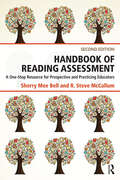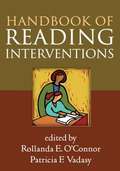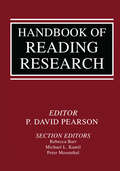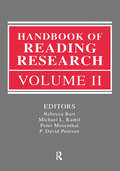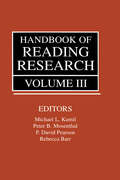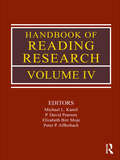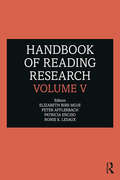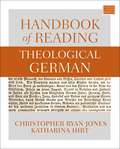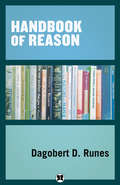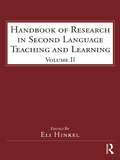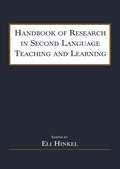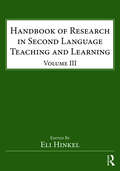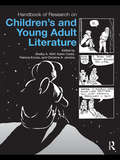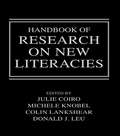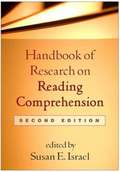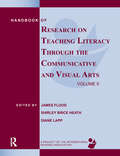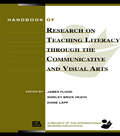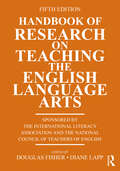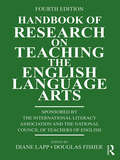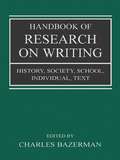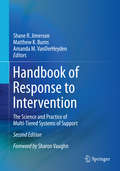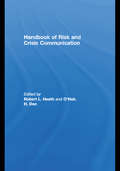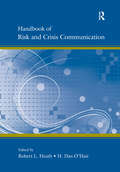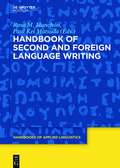- Table View
- List View
Handbook of Reading Assessment: A One-Stop Resource for Prospective and Practicing Educators
by Sherry Mee Bell R. Steve McCallumThe Handbook of Reading Assessment, Second Edition, covers the wide range of reading assessments educators must be able to use and understand to effectively assess and instruct their students. Comprehensive and filled with numerous authentic examples, the text addresses informal classroom based assessment, progress monitoring, individual norm-referenced assessment, and group norm-referenced or ‘high-stakes’ testing. Coverage includes assessment content relevant for English language learners and adults. A set of test guidelines to use when selecting or evaluating an assessment tool is provided. New and updated in the Second Edition Impact on reading assessment of Common Core Standards for literacy; increased top-down focus on accountability and high stakes tests; innovations in computerized assessment of reading Latest developments in Response to Intervention (RTI) model, particularly as they impact reading assessment International Reading Association standards for reading educators and brief discussion of International Dyslexia Association standards Types of reading assessment, including discussion of formative versus summative assessment Expanded coverage of assessment of reading motivation Expanded coverage of writing assessment New and revised assessments across genres of reading assessment Companion Website: numerous resources relevant to reading and writing assessment; suggestions for evidence-based instructional practices that can be linked to assessment results; PowerPoint slides; test bank; study guides; application exercises
Handbook of Reading Interventions
by Patricia Vadasy Rollanda O'ConnorComprehensive, authoritative, and designed for practical utility, this handbook presents evidence-based approaches for helping struggling readers and those at risk for literacy difficulties or delays. Leading experts explain how current research on all aspects of literacy translates into innovative classroom practices. Chapters include clear descriptions of effective interventions for word recognition, spelling, fluency, vocabulary, comprehension, and writing, complete with concrete examples and teaching scripts. Coverage also encompasses preschool literacy instruction and interventions for older readers, English language learners, and students with learning disabilities, as well as peer-mediated and tutoring approaches.
Handbook of Reading Research
by P. David Pearson, Rebecca Barr, Michael L. Kamil and Peter MosenthalThe influential first volume of the Handbook of Reading Research was published in 1984. This classic work, an essential resource for researchers, students, and professionals across the field of reading and literacy education, is now available once again in on-line and print-on-demand versions.
Handbook of Reading Research, Volume II
by Rebecca Barr, Michael L. Kamil, Peter B. Mosenthal and P. David PearsonA comprehensive overview of important contemporary issues in the field of reading research from the mid 1980s to mid 1990s, this well-received volume offers readers an examination of literacy through a variety of lenses--some permitting microscopic views and others panoramic views. A veritable "who's who" of specialists in the field, chapter authors cover current methodology, as well as cumulative research-based knowledge.Because it deals with society and literacy, the first section provides the broadest possible view of literacy. The second section defines the range of activities culturally determined to be a part of the enterprise known as literacy. The third focuses on the processes that individuals engage in when they perform the act of reading. The fourth section visits the environment in which the knowledge that comprises literacy is passed on from one generation to the next. The last section, an epilogue to the whole enterprise of reading research, provides apt philosophical reflection.
Handbook of Reading Research, Volume III: The Methodology Chapters From The Handbook Of Reading Research, Volume Iii
by Michael L. Kamil, Peter B. Mosenthal, P. David Pearson and Rebecca BarrIn Volume III, as in Volumes I and II, the classic topics of reading are included--from vocabulary and comprehension to reading instruction in the classroom--and, in addition, each contributor was asked to include a brief history that chronicles the legacies within each of the volume's many topics. However, on the whole, Volume III is not about tradition. Rather, it explores the verges of reading research between the time Volume II was published in 1991 and the research conducted after this date. The editors identified two broad themes as representing the myriad of verges that have emerged since Volumes I and II were published: (1) broadening the definition of reading, and (2) broadening the reading research program. The particulars of these new themes and topics are addressed.
Handbook of Reading Research, Volume IV
by P. David Pearson Michael L. Kamil Elizabeth Birr Moje Peter P. AfflerbachThe Handbook of Reading Research is the research Handbook for the field. Each volume has come to define the field for the period of time it covers. Volume IV follows in this tradition. The editors extensively reviewed the reading research literature since the publication of Volume III in 2000, as portrayed in a wide array of research and practitioner-based journals and books, to identify the themes and topics covered. As in previous volumes, the focus is on reading research, rather than a range of literate practices. When taken as a set, the four volumes provide a definitive history of reading research. Volume IV brings the field authoritatively and comprehensively up-to-date.
Handbook of Reading Research, Volume V
by Elizabeth Birr Moje Peter P. Afflerbach Patricia Enciso Nonie K LesauxIn a time of pressures, challenges, and threats to public education, teacher preparation, and funding for educational research, the fifth volume of the Handbook of Reading Research takes a hard look at why we undertake reading research, how school structures, contexts and policies shape students’ learning, and, most importantly, how we can realize greater impact from the research conducted. A comprehensive volume, with a "gaps and game changers" frame, this handbook not only synthesizes current reading research literature, but also informs promising directions for research, pushing readers to address problems and challenges in research design or method. Bringing the field authoritatively and comprehensively up-to-date since the publication of the Handbook of Reading Research, Volume IV, this volume presents multiple perspectives that will facilitate new research development, tackling topics including: Diverse student populations and sociocultural perspectives on reading development Digital innovation, literacies, and platforms Conceptions of teachers, reading, readers, and texts, and the role of affect, cognition, and social-emotional learning in the reading process New methods for researching reading instruction, with attention to equity, inclusion, and education policies Language development and reading comprehension Instructional practices to promote reading development and comprehension for diverse groups of readers Each volume of this handbook has come to define the field for the period of time it covers, and this volume is no exception, providing a definitive compilation of current reading research. This is a must-have resource for all students, teachers, reading specialists, and researchers focused on and interested in reading and literacy research, and improving both instruction and programs to cultivate strong readers and teachers.
Handbook of Reading Theological German
by Christopher Ryan Jones Katharina HirtThe Handbook of Reading Theological German is the premier resource for equipping those interested in reading and translating original German source materials and preparing academics for German comprehension examination. The book is ideal for students in biblical studies, church history, Jewish studies, and theology. Coauthored by Katharina Hirt, a native German speaker and professional linguist, and Christopher Ryan Jones, a native English speaker and doctoral candidate in biblical studies, this collaboration draws on the latest developments in linguistics to present a cutting-edge teaching methodology for graduate students learning to read German for research.Attuned to the specific needs of English speakers learning German, this handbook is well suited for independent study or for use in the classroom. Providing abundant exercises and readings, Jones and Hirt&’s work provides an excellent entry point for students required to learn theological German.The Handbook of Reading Theological German provides:An introduction to German grammarA demonstration of the role that German theology has had in the development of modern Jewish and Christian practices.Guided readings and biographies of six major German theologians and philosophersFurther, advanced readings with minimal guidance from contemporary authors in the areas of Hebrew Bible, New Testament, Jewish studies, church history, and theology, so that students can focus on literature from their chosen field of study
Handbook of Reason
by Dagobert D. RunesIn his most recent philosophical work, one of the modern world's pre-eminent thinkers offers a summation of his views on a wide range of topics of first and last importance, beginning with abstract art and ending with Zionism. Culled from years of patient research and fruitful introspection, his observations are bound to stimulate, challenge, and at times force upon the reader a shock of recognition grounded on timeless but at times obscured universal truths. Dr. Runes' word magic, now aphoristic, now cadenced and metaphorical, creates countless gems of wisdom, frequently poetic, often irresistibly quotable, always profoundly moving. A humanitarian theme evolved partly from personal tragedies permeates his lifelong search for "a life of God the Spirit and the Giver/(Of) God unbound and unencumbered/By hate or prejudice/A god to love by Deeds/Not hollow hymns and vows."
Handbook of Reason
by Dagobert D. RunesThe eminent philosopher presents a summation of his views on an encyclopedic range of topics from abstract art to Zionism.Culled from years of research and introspection, the diverse observations discussed in Handbook of Reason by Dagobert D. Runes are bound to stimulate, challenge, and at times force upon the reader a shock of recognition grounded in universal truths. In a style that moves from the aphoristic to the metaphorical, Runes offers countless gems of wisdom, often irresistibly quotable, and always profoundly moving. A humanitarian theme evolved partly from personal tragedies permeates his lifelong search for &“a life of God the Spirit and the Giver/(Of) God unbound and unencumbered/By hate or prejudice/A god to love by Deeds/Not hollow hymns and vows.&”
Handbook of Research in Second Language Teaching and Learning: Volume 2 (ESL & Applied Linguistics Professional Series)
by Eli HinkelThis landmark volume provides a broad-based, comprehensive, state-of-the-art overview of current knowledge and research into second language teaching and learning. All authors are leading authorities in their areas of expertise. The chapters, all completely new for Volume 2, are organized in eight thematic sections: Social Contexts in Research on Second Language Teaching and Learning Second Language Research Methods Second Language Research and Applied Linguistics Research in Second Language Processes and Development Methods and Instruction in Second Language Teaching Second Language Assessment Ideology, Identity, Culture, and Critical Pedagogy in Second Language Teaching and Learning Language Planning and Policy. Changes in Volume 2: captures new and ongoing developments, research, and trends in the field surveys prominent areas of research that were not covered in Volume 1 includes new authors from Asia, Australia, Europe, and North America to broaden the Handbook’s international scope. Volume 2 is an essential resource for researchers, faculty, teachers, and students in MA-TESL and applied linguistics programs, as well as curriculum and material developers.
Handbook of Research in Second Language Teaching and Learning: Volume 2 (Esl And Applied Linguistics Professional Ser.)
by Eli HinkelThis landmark volume provides a broad-based, state-of-the-art overview of current knowledge and research into second language teaching and learning. Fifty-seven chapters are organized in eight thematic sections:*social contexts of second language learning;*research methodologies in second-language learning, acquisition, and teaching;*contributions of applied linguistics to the teaching and learning of second language skills;*second language processes and development;*teaching methods and curricula;*issues in second or foreign language testing and assessment;*identity, culture, and critical pedagogy in second language teaching and learning; and*important considerations in language planning and policies.The Handbook of Research in Second Language Teaching and Learning is intended for researchers, practitioners, graduate students, and faculty in teacher education and applied linguistics programs; teachers; teacher trainers; teacher trainees; curriculum and material developers; and all other professionals in the field of second language teaching and learning.
Handbook of Research in Second Language Teaching and Learning: Volume III (ESL & Applied Linguistics Professional Series)
by Eli HinkelVolume III of the Handbook of Research in Second Language Teaching and Learning, like Volumes I and II, is a comprehensive, state-of-the-art overview of current research into social contexts of second language (L2)/foreign language (FL) teaching and learning; language policy; curriculum; types of instruction; incremental language skills such as listening, speaking, reading, writing, vocabulary, and grammar; international communication; pragmatics; assessment and testing. It differs from earlier volumes in its main purpose—to provide a more in-depth discussion and detailed focus on the development of the essential language skills required for any type of communication: speaking, listening, reading, vocabulary, grammar, and writing. Volume III preserves continuity with previous volumes in its coverage of all the classical areas of research in L2/FL teaching and learning and applied linguistics, but rather than offering a historical review of disciplinary traditions, it explores innovations and new directions of research, acknowledges the enormous complexity of teaching and learning the essential language abilities, and offers a diversity of perspectives. Chapter authors are all leading authorities in their disciplinary areas. What’s new in Volume III? Updates the prominent areas of research, including the sub-disciplines addressed in Volumes I and II, and represents the disciplinary mainstays Considers and discusses perspectives held by different schools of thought on the what, the how, and the why of teaching foundational language skills, including theories, pedagogical principles, and their implementation in practice Captures new and ongoing developments and trends in the key areas of L2/FL teaching and learning, and innovative research topics that have gained substantial recognition in current publications, including the role of corpora, technology, and digital literacy in L2/FL teaching and learning Examines new trends in language pedagogy and research, such as an increased societal emphasis on teaching academic language for schooling, somewhat contradictory definitions of literacy, and the growing needs for instruction in intercultural communication.
Handbook of Research on Children's and Young Adult Literature
by Shelby A. WolfThis landmark volume is the first to bring together leading scholarship on children’s and young adult literature from three intersecting disciplines: Education, English, and Library and Information Science. Distinguished by its multidisciplinary approach, it describes and analyzes the different aspects of literary reading, texts, and contexts to illuminate how the book is transformed within and across different academic figurations of reading and interpreting children’s literature. Part one considers perspectives on readers and reading literature in home, school, library, and community settings. Part two introduces analytic frames for studying young adult novels, picturebooks, indigenous literature, graphic novels, and other genres. Chapters include commentary on literary experiences and creative production from renowned authors and illustrators. Part three focuses on the social contexts of literary study, with chapters on censorship, awards, marketing, and literary museums. The singular contribution of this Handbook is to lay the groundwork for colleagues across disciplines to redraw the map of their separately figured worlds, thus to enlarge the scope of scholarship and dialogue as well as push ahead into uncharted territory.
Handbook of Research on New Literacies
by Julie Coiro Donald J. Leu Colin Lankshear Michele KnobelSituated at the intersection of two of the most important areas in educational research today — literacy and technology — this handbook draws on the potential of each while carving out important new territory. It provides leadership for this newly emerging field, directing scholars to the major issues, theoretical perspectives, and interdisciplinary research pertaining to new literacies. Reviews of research are organized into six sections: Methodologies Knowledge and Inquiry Communication Popular Culture, Community, and Citizenship: Everyday Literacies Instructional Practices and Assessment Multiple Perspectives on New Literacies Research FEATURES Brings together a diverse international team of editors and chapter authors Provides an extensive collection of research reviews in a critical area of educational research Makes visible the multiple perspectives and theoretical frames that currently drive work in new literacies Establishes important space for the emerging field of new literacies research Includes a unique Commentary section: The final section of the Handbook reprints five central research studies. Each is reviewed by two prominent researchers from their individual, and different, theoretical position. This provides the field with a sense of how diverse lenses can be brought to bear on research as well as the benefits that accrue from doing so. It also provides models of critical review for new scholars and demonstrates how one might bring multiple perspectives to the study of an area as complex as new literacies research. The Handbook of Research on New Literacies is intended for the literacy research community, broadly conceived, including scholars and students from the traditional reading and writing research communities in education and educational psychology as well as those from information science, cognitive science, psychology, sociolinguistics, computer mediated communication, and other related areas that find literacy to be an important area of investigation.
Handbook of Research on Reading Comprehension, Second Edition
by Gerald G. Duffy Susan E. IsraelThis esteemed reference work and professional resource, now substantially revised, integrates classic and cutting-edge research on how children and adolescents make meaning from text. The comprehension tasks and challenges facing students at different grade levels are explored, with attention to multiple text types and reading purposes. Preeminent researchers offer a range of perspectives--cognitive, neuroscientific, sociocultural, pedagogical, and technological--on key aspects of comprehension. Effective approaches to assessment, instruction, and intervention are reviewed. The volume also addresses issues in teaching specific populations, including struggling readers and English language learners. New to This Edition *A decade's worth of significant research advances are reflected in 10 entirely new chapters. *Revised throughout to incorporate new studies and timely topics: the expanding role of technology, changing school populations, the Common Core standards, international research, and more. *Chapters on graphic, scientific, and multiple digital texts. *Chapters on fluency, professional learning, and literacy coaching.
Handbook of Research on Teaching Literacy Through the Communicative and Visual Arts, Volume II: A Project of the International Reading Association
by James Flood Diane Lapp Shirley Brice HeathThe Handbook of Research on Teaching Literacy Through the Communicative and Visual Arts, Volume II brings together state-of-the-art research and practice on the evolving view of literacy as encompassing not only reading, writing, speaking, and listening, but also the multiple ways through which learners gain access to knowledge and skills. It forefronts as central to literacy education the visual, communicative, and performative arts, and the extent to which all of the technologies that have vastly expanded the meanings and uses of literacy originate and evolve through the skills and interests of the young. A project of the International Reading Association, published and distributed by Routledge/Taylor & Francis. Visit http://www.reading.org for more information about Internationl Reading Associationbooks, membership, and other services.
Handbook of Research on Teaching Literacy Through the Communicative and Visual Arts: Sponsored by the International Reading Association
by James Flood Diane Lapp Shirley Brice HeathIn an era characterized by the rapid evolution of the concept of literacy, the Handbook of Research on Teaching Literacy Through the Communicative and Visual Arts focuses on multiple ways in which learners gain access to knowledge and skills. The handbook explores the possibilities of broadening current conceptualizations of literacy to include the full array of the communicative arts (reading, writing, speaking, listening, viewing) and to focus on the visual arts of drama, dance, film, art, video, and computer technology. The communicative and visual arts encompass everything from novels and theatrical performances to movies and video games. In today's world, new methods for transmitting information have been developed that include music, graphics, sound effects, smells, and animations. While these methods have been used by television shows and multimedia products, they often represent an unexplored resource in the field of education. By broadening our uses of these media, formats, and genres, a greater number of students will be motivated to see themselves as learners. In 64 chapters, organized in seven sections, teachers and other leading authorities in the field of literacy provide direction for the future: I. Theoretical Bases for Communicative and Visual Arts Teaching Paul Messaris, Section Editor II. Methods of Inquiry in Communicative and Visual Arts Teaching Donna Alvermann, Section Editor III. Research on Language Learners in Families, Communities, and Classrooms Vicki Chou, Section Editor IV. Research on Language Teachers: Conditions and Contexts Dorothy Strickland, Section Editor V. Expanding Instructional Environments: Teaching, Learning, and Assessing the Communicative and Visual Arts Nancy Roser, Section Editor VI. Research Perspectives on the Curricular, Extracurricular, and Policy Perspectives James Squire, Section Editor VII. Voices from the Field Bernice Cullinan and Lee Galda, Section Editors The International Reading Association has compiled in the Handbook of Research on Teaching Literacy Through the Communicative and Visual Arts an indispensable set of papers for educators that will enable them to conceptualize literacy in much broader contexts than ever before. The information contained in this volume will be extremely useful in planning literacy programs for our students for today and tomorrow.
Handbook of Research on Teaching the English Language Arts
by Douglas Fisher Diane LappNow in its fifth edition, the Handbook of Research on Teaching the English Language Arts--sponsored by the International Literacy Association and the National Council of Teachers of English--remains at the forefront in bringing together prominent scholars, researchers, and professional leaders to offer an integrated perspective on teaching the English language arts and a comprehensive overview of research in the field. Reflecting important developments since the publication of the fourth edition in 2017, this new edition is streamlined and completely restructured around "big ideas" in the field related to theoretical and research foundations, learners in context, and new literacies. Addressing all the language arts within a holistic perspective (speaking/listening, viewing, language, writing, reading), it covers new and important topics, such as online learning, multimodalities, culturally responsive learning, and more.
Handbook of Research on Teaching the English Language Arts: Co-sponsored By The International Reading Association And The National Council Of Teachers Of English
by Douglas Fisher Diane LappNow in its fourth edition, the Handbook of Research on Teaching the English Language Arts – sponsored by the International Literacy Association and the National Council of Teachers of English – remains at the forefront in bringing together prominent scholars, researchers, and professional leaders to offer an integrated perspective on teaching the English language arts and a comprehensive overview of research in the field. Reflecting important developments since the publication of the third edition in 2010, this new edition is streamlined and completely restructured around "big ideas" in the field related to theoretical and research foundations, learners in context, and new literacies. A Companion Website extends and enhances the Handbook with a wealth of additional resources. The Handbook of Research on Teaching the English Language Arts, Fourth Edition: Addresses all of the language arts within a holistic perspective (speaking/listening, language, writing, reading). Is well grounded and balanced in theory and research while promoting validated practice. Features authors who are known for their expertise and who represent diversity in culture, years in the profession, and geographic location. Gives attention to special populations and instructional contexts. Includes new media literacies. Has the authority of a research handbook while remaining practical for students in masters and doctoral classes.
Handbook of Research on Writing: History, Society, School, Individual, Text
by Charles BazermanThe Handbook of Research on Writing ventures to sum up inquiry over the last few decades on what we know about writing and the many ways we know it: How do people write? How do they learn to write and develop as writers? Under what conditions and for what purposes do people write? What resources and technologies do we use to write? How did our current forms and practices of writing emerge within social history? What impacts has writing had on society and the individual? What does it mean to be and to learn to be an active participant in contemporary systems of meaning? This cornerstone volume advances the field by aggregating the broad-ranging, interdisciplinary, multidimensional strands of writing research and bringing them together into a common intellectual space. Endeavoring to synthesize what has been learned about writing in all nations in recent decades, it reflects a wide scope of international research activity, with attention to writing at all levels of schooling and in all life situations. Chapter authors, all eminent researchers, come from disciplines as diverse as anthropology, archeology, typography, communication studies, linguistics, journalism, sociology, rhetoric, composition, law, medicine, education, history, and literacy studies. The Handbook’s 37 chapters are organized in five sections:*The History of Writing;*Writing in Society;*Writing in Schooling;*Writing and the Individual; *Writing as Text This volume, in summing up what is known about writing, deepens our experience and appreciation of writing—in ways that will make teachers better at teaching writing and all of its readers better as individual writers. It will be interesting and useful to scholars and researchers of writing, to anyone who teaches writing in any context at any level, and to all those who are just curious about writing.
Handbook of Response to Intervention
by Shane R. Jimerson Matthew K. Burns Amanda M. VanderheydenThe Second Edition of this essential handbook provides a comprehensive, updated overview of the science that informs best practices for the implementation of response to intervention (RTI) processes within Multi-Tiered Systems of Support (MTSS) to facilitate the academic success of all students. The volume includes insights from leading scholars and scientist-practitioners to provide a highly usable guide to the essentials of RTI assessment and identification as well as research-based interventions for improving students' reading, writing, oral, and math skills. New and revised chapters explore crucial issues, define key concepts, identify topics warranting further study, and address real-world questions regarding implementation. Key topics include: Scientific foundations of RTI Psychometric measurement within RTI RTI and social behavior skills The role of consultation in RTI Monitoring response to supplemental services Using technology to facilitate RTI RTI and transition planning Lessons learned from RTI programs around the country The Second Edition of the Handbook of Response to Intervention is an essential resource for researchers, graduate students, and professionals/scientist-practitioners in child and school psychology, special and general education, social work and counseling, and educational policy and politics.
Handbook of Risk and Crisis Communication (Routledge Communication Ser.)
by H. Dan O'Hair Robert L. HeathThe Handbook of Risk and Crisis Communication explores the scope and purpose of risk, and its counterpart, crisis, to facilitate the understanding of these issues from conceptual and strategic perspectives. Recognizing that risk is a central feature of our daily lives, found in relationships, organizations, governments, the environment, and a wide variety of interactions, contributors to this volume explore such questions as: "What is likely to happen, to whom, and with what consequences?"; "To what extent can science and vigilance prevent or mitigate negative outcomes?"; and "What obligation do some segments of local, national, and global populations have to help other segments manage risks?", shedding light on the issues in the quest for definitive answers. The Handbook offers a broad approach to the study of risk and crisis as joint concerns. Chapters explore the reach of crisis and risk communication, define and examine key constructs, and parse the contexts of these vital areas. As a whole, the volume presents a comprehensive array of studies that highlight the standard principles and theories on both topics, serving as the largest effort to date focused on engaging risk communication discussions in a comprehensive manner. With perspectives from psychology, sociology, anthropology, political science, economics, and communication, the Handbook of Risk and Crisis Communication enlarges the approach to defining and recognizing risk and how should it best be managed. It provides vital insights for all disciplines studying risk, including communication, public relations, business, and psychology, and will be required reading for scholars and researchers investigating risk and crisis in various contexts.
Handbook of Risk and Crisis Communication (Routledge Communication Series)
by Robert L. Heath; H. Dan O’HairThe Handbook of Risk and Crisis Communication explores the scope and purpose of risk, and its counterpart, crisis, to facilitate the understanding of these issues from conceptual and strategic perspectives. Recognizing that risk is a central feature of our daily lives, found in relationships, organizations, governments, the environment, and a wide variety of interactions, contributors to this volume explore such questions as "What is likely to happen, to whom, and with what consequences?" "To what extent can science and vigilance prevent or mitigate negative outcomes?" and "What obligation do some segments of local, national, and global populations have to help other segments manage risks?", shedding light on the issues in the quest for definitive answers.The Handbook offers a broad approach to the study of risk and crisis as joint concerns. Chapters explore the reach of crisis and risk communication, define and examine key constructs, and parse the contexts of these vital areas. As a whole, the volume presents a comprehensive array of studies that highlight the standard principles and theories on both topics, serving as the largest effort to date focused on engaging risk communication discussions in a comprehensive manner. Now available in paperback, the Handbook of Risk and Crisis Communication can be readily used in graduate coursework and individual research programs. With perspectives from psychology, sociology, anthropology, political science, economics, and communication, the Handbook provides vital insights for all disciplines studying risk, and is required reading for scholars and researchers investigating risk and crisis in various contexts.
Handbook of Second and Foreign Language Writing (Handbooks Of Applied Linguistics #11)
by Paul Kei Matsuda Rosa M. ManchónThe Handbook of Second and Foreign Language Writing is an authoritative reference compendium of the theory and research on second and foreign language writing that can be of value to researchers, professionals, and graduate students. It is intended both as a retrospective critical reflection that can situate research on L2 writing in its historical context and provide a state of the art view of past achievements, and as a prospective critical analysis of what lies ahead in terms of theory, research, and applications. Accordingly, the Handbook aims to provide (i) foundational information on the emergence and subsequent evolution of the field, (ii) state-of-the-art surveys of available theoretical and research (basic and applied) insights, (iii) overviews of research methods in L2 writing research, (iv) critical reflections on future developments, and (iv) explorations of existing and emerging disciplinary interfaces with other fields of inquiry.
